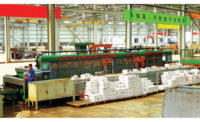More than 25 years ago, Brian, Mike and John Rector first started pulling fieldstone out of the woods and hills of Tennessee with their father. They recognized there was an opportunity in the masonry business and started Plateau Masonry in 1986. Over the years, the company expanded to include flagstone and dimensional stone quarries, and in 1999, BMJ Stone was created. The Fall Creek Select quarry, featuring shades of tans and browns, in addition to other sandstone quarries and fieldstone products, grew from popular demand. BMJ Stone currently brings in 800 to 1,000 tons of raw stone a week into its yard for processing. Last year, an opportunity arose to further expand the business. Mike and John Rector were presented with the offer to be a part of another storied and historic quarry. The end result was the acquisition of Tennessee Building Stone.
For more than a century, the legacy of Crab Orchard quartzite is chiseled in the memories of the settlers who first discovered the stackable stone, the quarry laborers who mined it, the craftsmen who cut and placed it, and the architects who specified it. Tennessee Building Stone is one of the major players in the localized Tennessee stone industry, and they have been in the forefront of promoting Crab Orchard stone for decades. Tennessee Building Stone’s durable varieties of quartzite have been used at Harvard University, Cambridge, Rockefeller Center, the U.S. Vice President’s mansion, the Governor’s mansion in Nashville, TN, McGee Tyson Airport, Disney World and also the home of country singer Tim McGraw.
As of July 1, 2017, BMJ Stone purchased Tennessee Building Stone, and the company looks to revitalize the facilities and hope to revitalize the historic name and quality, of the product and service of Tennessee Building Stone. “We are going to revitalize the historic name and quality, the product and the service of Tennessee Building Stone,” said Matt Feinauer, sales manager of BMJ Stone. “Tennessee Building Stone started in the 50s and it’s known as a sawn stone company.”
David and Sandra Rose operated the business for years and were well known by people associated with Tennessee Building Stone as owners with high integrity and ethics in the industry. Because of them and their production of the infamous Crab Orchard Stone, the business was known for being a leading sawn quartzitic sandstone company.
Tennessee Building Stone is currently installing two thin stone saws at their facility, as well as bringing in several pieces of equipment from overseas, including an automated splitter line, water filter and a multi-blade saw. “Our goal with the new equipment is to help increase production for Tennessee Building Stone, meanwhile creating a sustainable future,” said Feinauer. “We are getting it automated to the point where we will be able to use much less labor per ton produced and ultimately minimize lead times. We hope this will make it easier on our guys and will be more operator friendly.”
According to co-owner John Rector, the merger for BMJ Stone means continuing the legacy that Tennessee Building Stone has built, and to assure the industry of the quality that they have stood by. “They have built a reputation for that quality and for the good of the industry, and the interest that we have is to maintain the quality that they’ve kept and demanded for the past projects,” said John Rector. “We want to continue that, build on that and bring new innovation into the opportunities that are there, and then build on that by expanding both domestic and international sales.”
Fellow co-owner Mike Rector said he sees this as an opportunity for all of us to bring our team to new markets that they haven’t been involved in yet. “Tennessee Building Stone has an untarnished reputation,” said Mike Rector. “David Rose, his brothers Roy and Chester, and their father R.L. Rose before them, have done an outstanding job over the years, and that reputation is still there. John and I just wanted to take the opportunity to merge with this company and bring it back to the mainstream of the stone industry.”







